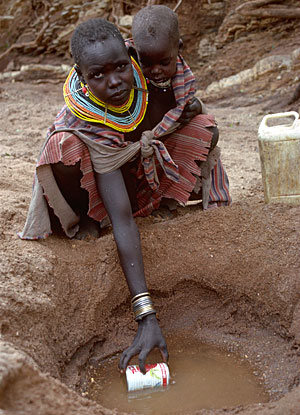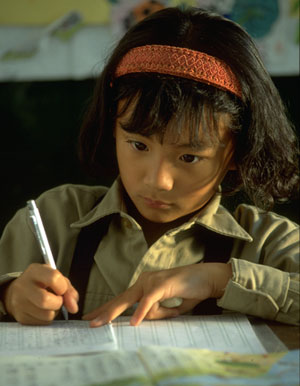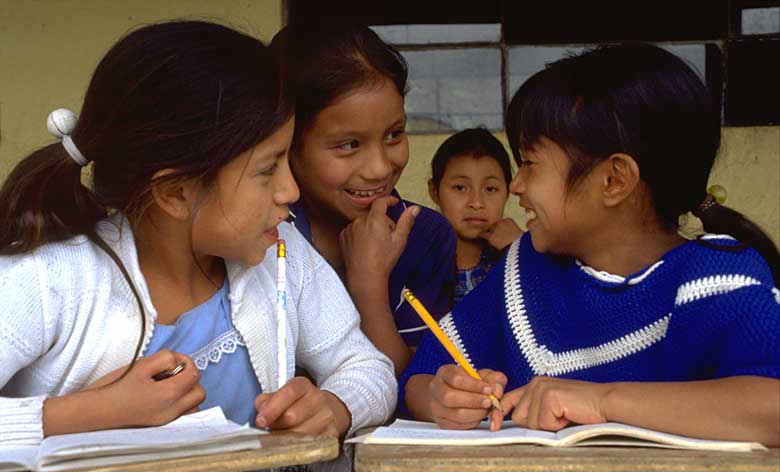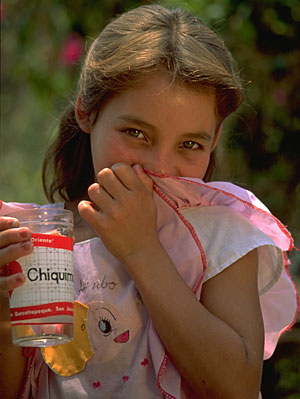|
Girls: Household Servants
When a boy is born in most developing countries, friends and relatives exclaim congratulations. A son means insurance. He will inherit his father's property and get a job to help support the family. When a girl is born, the reaction is very different. Some women weep when they find out their baby is a girl because, to them, a daughter is just another expense. Her place is in the home, not in the world of men. In some parts of India, it's traditional to greet a family with a newborn girl by saying, "The servant of your household has been born."
A girl can't help but feel inferior when everything around her tells her that she is worth less than a boy. Her identity is forged as soon as her family and society limit her opportunities and declare her to be second-rate.
A combination of extreme poverty and deep biases against women creates a remorseless cycle of discrimination that keeps girls in developing countries from living up to their full potential. It also leaves them vulnerable to severe physical and emotional abuse. These "servants of the household" come to accept that life will never be any different.
Greatest Obstacles Affecting Girls
 Discrimination against girls and women in the developing world is a devastating reality. It results in millions of individual tragedies, which add up to lost potential for entire countries. Studies show there is a direct link between a country's attitude toward women and its progress socially and economically. The status of women is central to the health of a society. If one part suffers, so does the whole. Discrimination against girls and women in the developing world is a devastating reality. It results in millions of individual tragedies, which add up to lost potential for entire countries. Studies show there is a direct link between a country's attitude toward women and its progress socially and economically. The status of women is central to the health of a society. If one part suffers, so does the whole.
Tragically, female children are most defenseless against the trauma of gender discrimination. The following obstacles are stark examples of what girls worldwide face. But the good news is that new generations of girls represent the most promising source of change for women—and men—in the developing world today.
Dowry
In developing countries, the birth of a girl causes great upheaval for poor families. When there is barely enough food to survive, any child puts a strain on a family's resources. But the monetary drain of a daughter feels even more severe, especially in regions where dowry is practiced.
Dowry is goods and money a bride's family pays to the husband's family. Originally intended to help with marriage expenses, dowry came to be seen as payment to the groom's family for taking on the burden of another woman. In some countries, dowries are extravagant, costing years' worth of wages, and often throwing a woman's family into debt. The dowry practice makes the prospect of having a girl even more distasteful to poor families. It also puts young women in danger: A new bride is at the mercy of her in-laws should they decide her dowry is too small. UNICEF estimates that around 5,000 Indian women are killed in dowry-related incidents each year.
Neglect
The developing world is full of poverty-stricken families who see their daughters as an economic predicament. That attitude has resulted in the widespread neglect of baby girls in Africa, Asia, and South America. In many communities, it's a regular practice to breastfeed girls for a shorter time than boys so that women can try to get pregnant again with a boy as soon as possible. As a result, girls miss out on life-giving nutrition during a crucial window of their development, which stunts their growth and weakens their resistance to disease.
Statistics show that the neglect continues as they grow up. Young girls receive less food, healthcare and fewer vaccinations overall than boys. Not much changes as they become women. Tradition calls for women to eat last, often reduced to picking over the leftovers from the men and boys.
Infanticide and Sex-Selective Abortion
In extreme cases, parents make the horrific choice to end their baby girl's life. One woman named Lakshmi from Tamil Nadu, an impoverished region of India, fed her baby sap from an oleander bush mixed with castor oil until the girl bled from the nose and died. "A daughter is always liabilities. How can I bring up a second?" said Lakshmi to explain why she chose to end her baby's life. "Instead of her suffering the way I do, I thought it was better to get rid of her."
Sex-selective abortions are even more common than infanticides in India. They are growing ever more frequent as technology makes it simple and cheap to determine a fetus' gender. In Jaipur, a Western Indian city of 2 million people, 3,500 sex-determined abortions are carried out every year. The gender ratio across India has dropped to an unnatural low of 927 females to 1,000 males due to infanticide and sex-based abortions.
China has its own long legacy of female infanticide. In the last two decades, the government's infamous one-child policy has weakened the country's track record even more. By restricting household size to limit the population, the policy gives parents just one chance to produce a coveted son before being forced to pay heavy fines for additional children. In 1997, the World Health Organization declared, "…more than 50 million women were estimated to be 'missing' in China because of the institutionalized killing and neglect of girls due to Beijing's population control program." The Chinese government says that sex-selective abortion is one major explanation for the staggering number of Chinese girls who have simply vanished from the population in the last 20 years.
Abuse
Even after infancy, the threat of physical harm follows girls throughout their lives. Women in every society are vulnerable to abuse. But the threat is more severe for girls and women who live in societies where women's rights mean practically nothing. Mothers who lack their own rights have little protection to offer their daughters, much less themselves, from male relatives and other authority figures. The frequency of rape and violent attacks against women in the developing world is alarming. Forty-five percent of Ethiopian women say that they have been assaulted in their lifetimes. In 1998, 48 percent of Palestinian women admitted to being abused by an intimate partner within the past year.
In some cultures, the physical and psychological trauma of rape is compounded by an additional stigma. In cultures that maintain strict sexual codes for women, if a woman steps out of bounds—by choosing her own husband, flirting in public, or seeking divorce from an abusive partner—she has brought dishonor to her family and must be disciplined. Often, discipline means execution. Families commit "honor killings" to salvage their reputation tainted by disobedient women.
Appallingly, this "disobedience" includes rape. In 1999, a 16-year-old mentally handicapped girl in Pakistan who had been raped was brought before her tribe's judicial counsel. Although she was the victim and her attacker had been arrested, the counsel decided she had brought shame to the tribe and ordered her public execution. This case, which received a lot of publicity at the time, is not unusual. Three women fall victim to honor killings in Pakistan every day—including victims of rape. In areas of Asia, the Middle East, and even Europe, all responsibility for sexual misconduct falls, by default, to women.
Labor
 For the young girls who escape these pitfalls and grow up relatively safely, daily life is still incredibly hard. School might be an option for a few years, but most girls are pulled out at age 9 or 10 when they're useful enough to work all day at home. Nine million more girls than boys miss out on school every year, according to UNICEF. While their brothers continue to go to classes or pursue their hobbies and play, they join the women to do the bulk of the housework. For the young girls who escape these pitfalls and grow up relatively safely, daily life is still incredibly hard. School might be an option for a few years, but most girls are pulled out at age 9 or 10 when they're useful enough to work all day at home. Nine million more girls than boys miss out on school every year, according to UNICEF. While their brothers continue to go to classes or pursue their hobbies and play, they join the women to do the bulk of the housework.
Housework in developing countries consists of continuous, difficult physical labor. A girl is likely to work from before daybreak until the light drains away. She walks barefoot long distances several times a day carrying heavy buckets of water, most likely polluted, just to keep her family alive. She cleans, grinds corn, gathers fuel, tends to the fields, bathes her younger siblings, and prepares meals until she sits down to her own after all the men in the family have eaten. Most families can't afford modern appliances, so her tasks must be done by hand—crushing corn into meal with heavy rocks, scrubbing laundry against rough stones, kneading bread and cooking gruel over a blistering open fire. There is no time left in the day to learn to read and write or to play with friends. She collapses exhausted each night, ready to wake up the next morning to start another long workday.
Most of this labor is performed without recognition or reward. UN statistics show that although women produce half the world's food, they own only 1 percent of its farmland. In most African and Asian countries, women's work isn't even considered real labor. Should a woman take a job, she is expected to keep up all her responsibilities at home in addition to her new ones, with no extra help. Women's labor goes overlooked, even though it is crucial to the survival of each family.
Sex Trafficking
Some families decide it's more lucrative to send their daughters to a nearby town or city to get jobs that usually involve hard labor and little pay. That desperate need for income leaves girls easy prey to sex traffickers, particularly in Southeast Asia, where international tourism gorges the illegal industry. In Thailand, the sex trade has swelled without check into a main sector of the national economy. Families in small villages along the Chinese border are regularly approached by recruiters called "aunties" who ask for their daughters in exchange for six years' wages. Most Thai farmers earn only $150 a year. The offer can be too tempting to refuse.
The girls who are forced into prostitution to support their families often feel their burden deeply. "When I was at work, 50 percent of me hated what I was doing," said one 14-year-old girl, who felt conflicted about being taken out of a brothel in Chiang Mai, Thailand. "But the other 50 percent wanted to stay so that I could earn money for my parents. My father cannot work. He is very old and I must support the family. It is my job."
It's estimated that 1 million children around the world are involved in the sex trade; a third of all sex workers in Southeast Asia are between the ages of 12 and 17.
Girls' Education: Breaking the Pattern of Gender Discrimination
 Education is the tool that can help break the pattern of gender discrimination and bring lasting change for women in developing countries. Education is the tool that can help break the pattern of gender discrimination and bring lasting change for women in developing countries.
Educated women are essential to ending gender bias, starting by reducing the poverty that makes discrimination even worse in the developing world. The most basic skills in literacy and arithmetic open up opportunities for better-paying jobs for women. Uneducated women in rural areas of Zambia, for instance, are twice as likely to live in poverty as those who have had eight or more years of education. The longer a girl is able to stay in school, the greater her chances to pursue worthwhile employment, higher education, and a life without the hazards of extreme poverty.
Women who have had some schooling are more likely to get married later, survive childbirth, have fewer and healthier children, and make sure their own children complete school. They also understand hygiene and nutrition better and are more likely to prevent disease by visiting health care facilities. The UN estimates that for every year a woman spends in primary school, the risk of her child dying prematurely is reduced by 8 percent.
Girls' education also means comprehensive change for a society. As women get the opportunity to go to school and obtain higher-level jobs, they gain status in their communities. Status translates into the power to influence their families and societies.
Even bigger changes become possible as girls' education becomes the cultural norm. Women can't defend themselves against physical and sexual abuse until they have the authority to speak against it without fear. Knowledge gives that authority. Women who have been educated are half as likely to undergo harmful cultural practices such as female genital mutilation (FGM) and four times as likely to protect their daughters from it. The Global Campaign for Education also states that a primary education defends women against HIV/AIDS infection—disproportionately high for women in developing countries—by giving "the most marginalized groups in society—notably young women—the status and confidence needed to act on information and refuse unsafe sex."
FGM and HIV/AIDS are too large to adequately address in this article, but they represent desperate challenges to the basic health and well-being of women in developing countries. Click here to learn more about FGM, HIV/AIDS, and women in the developing world.

How to Help
You can help pull down the barriers that keep girls from attending school and begin to bring change for women in developing countries. The most direct way is by easing the financial need that forces families to take their children out of school in the first place.
Dozens of international organizations are working to improve the livelihood of impoverished people. By building infrastructure and providing aid, vocational training, and education programs, they give families in developing countries resources to create healthy and stable lives. That takes the burden of mere survival off young women and gives them the time to get an education. With practical help and encouragement, girls are more likely to enroll and stay in school.
UNICEF is encouraging all international organizations to come up with strategies for girls' education as part of their initial development plans. It has also started a movement to monitor school materials, facilities, and teachers to ensure that girls get a quality education that promotes appropriate perceptions of women, and that female students are given the same privileges as male students. All UNICEF and other reputable organizations need now are the resources to fund their efforts.
You can help begin to change the lives of women around the world by making a financial gift or raising awareness about girls in the developing world today. Children In Need offers internships and volunteer opportunities to people who want to help raise awareness of the issues tha impact children. You can support Amnesty International, UNICEF, UNIFEM and INSTRAW. Or find another organization you’d like to support through Interaction. The need is clear, and though the obstacles to ending gender discrimination are high, they are not insurmountable.
Children In Need
Reports • World
Week • Help a
Child

Copyright © 1998-2019, Children
In Need Inc.
|
|
|
 In this story:
In this story: Discrimination against girls and women in the developing world is a devastating reality. It results in millions of individual tragedies, which add up to lost potential for entire countries. Studies show there is a direct link between a country's attitude toward women and its progress socially and economically. The status of women is central to the health of a society. If one part suffers, so does the whole.
Discrimination against girls and women in the developing world is a devastating reality. It results in millions of individual tragedies, which add up to lost potential for entire countries. Studies show there is a direct link between a country's attitude toward women and its progress socially and economically. The status of women is central to the health of a society. If one part suffers, so does the whole. For the young girls who escape these pitfalls and grow up relatively safely, daily life is still incredibly hard. School might be an option for a few years, but most girls are pulled out at age 9 or 10 when they're useful enough to work all day at home. Nine million more girls than boys miss out on school every year, according to UNICEF. While their brothers continue to go to classes or pursue their hobbies and play, they join the women to do the bulk of the housework.
For the young girls who escape these pitfalls and grow up relatively safely, daily life is still incredibly hard. School might be an option for a few years, but most girls are pulled out at age 9 or 10 when they're useful enough to work all day at home. Nine million more girls than boys miss out on school every year, according to UNICEF. While their brothers continue to go to classes or pursue their hobbies and play, they join the women to do the bulk of the housework. Education is the tool that can help break the pattern of gender discrimination and bring lasting change for women in developing countries.
Education is the tool that can help break the pattern of gender discrimination and bring lasting change for women in developing countries.